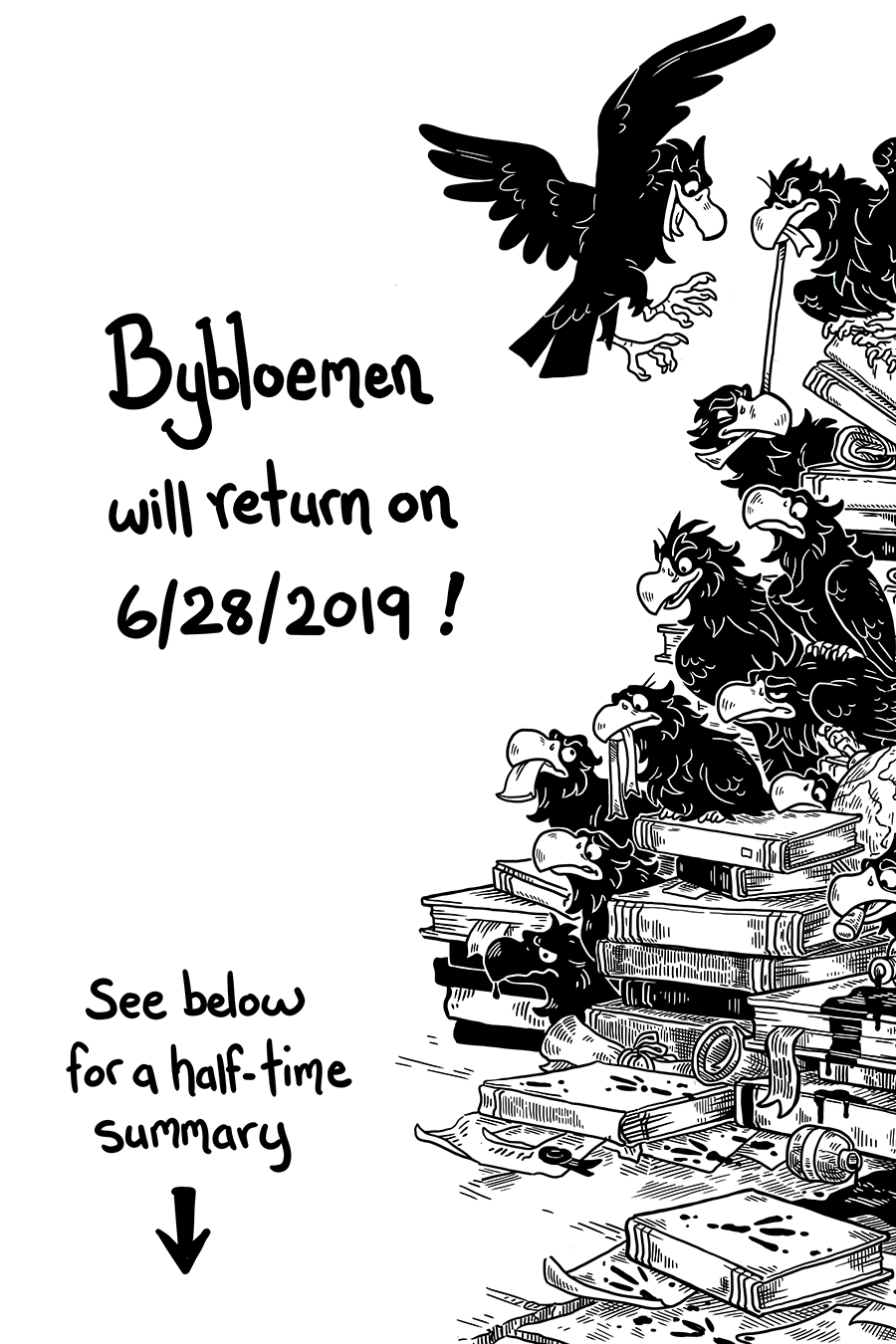
The author is out of the office for the next few days getting scalded on an ill-advised summer hiking trip, so this week’s update is a brief recap of the first half of chapter 1. The back half of the chapter starts next week (6/28), so think of this as a SparkNotes summary of relevant plot points for new readers (or dedicated readers who want a quick refresher)!
Story summary:
The year is 1636, and the devils Basil and Ludwig have been tasked with investigating rumors of avaricious behavior involving the tulip trade in the small Dutch town of Stenen Brug. They arrive on the surface in the woods many miles away from their intended destination, and Basil’s familiar, a raven named Crumb, is tasked with scouting ahead for a road leading to the city.
We learn that both devils are employees of The Adversary. Basil is an experienced tempter in the Department of Avaritia, and Ludwig is his newly assigned apprentice. This is his first assignment upstairs and although he’s trying to make a good first impression, hasn’t quite mastered appearing fully human yet. Realizing that Ludwig has been traipsing around in bird feet, Basil suggests that he wears heavy boots and a cloak until he gets used to wearing a glamour.
The devils make their way to Stenen Brug by way of a winding country road. They come across a small farmstead, where a family is raising chickens. Basil asks for lodging suggestions suitable for a pair of merchants in Stenen Brug, and is provided with reviews of several local taverns. One of the farmers tells Basil that a neighbor, a man named Geert, struck it rich in the tulip trade after finding a breaker (striped tulip) in a batch of white bulbs. The farmer considers dabbling in the trade himself, and Basil gently convinces him that it’s a good idea. Meanwhile, Ludwig acquires a sack of provisions and a black rooster, for which he substantially overpays. His behavior is odd enough to attract attention, and Basil hustles his apprentice back on the road. The young farmer paid by Ludwig tucks the coin she was given into her apron without showing it her partner.
As they continue toward the city, Basil admonishes Ludwig for calling so much attention to himself. Ludwig explains that he purchased the rooster with the intention of employing him as a familiar, since the disagreeable creature has a suitable temperament for the role. Basil lectures Ludwig on the finer points of tempting (rule one: don’t employ domesticates as familiars, rule two: blend in), explaining that “it’s not the Dark Ages anymore”. Humans don’t respect infernal emissaries like they did in the old days and have gotten better at rooting out witchcraft. Even if their methods are crude, they nonetheless present a danger to incautious tempters. Ludwig does not seem terribly impressed by this lecture.
Crumb alerts the devils to a cart traveling in their direction. Basil tells Ludwig to just stand aside and watch, and that he’ll handle it. The driver, a man named Joop, hails them and immediately launches into a pitch for a mysterious product. Basil tries to wave him off, but his wife (Jutte), bursts out of the cart and starts aggressively pitching a miracle elixir. Although the elixir is described as having miraculous rejuvenating effects, the active ingredient is almost certainly cat pee. Ludwig is irritated by Jutte’s performance, but Basil compliments her (if somewhat backhandedly) and advises the pair of charlatans on how their business could be improved. Joop and Jutte ask if Basil plans to invest, and he flips their request back on them, explaining that his advice as a renowned merchant is worth 10% of their business. The couple agrees to this terrible deal and makes plans to meet up with Basil in the future for additional consultation.
As they part ways, Ludwig expresses admiration for Basil’s business acumen, but Basil is too busy complaining about human economic behavior to acknowledge this. The devils briefly discuss mercantilism and its strange influence on humans, with Ludwig expressing some reservations about the Dutch.
We cut to a bridge outside of Stenen Brug. It’s market day, and people are moving into the city in droves. A woman is looking over the side of the bridge, watching a flower carried along by the current as it slowly disintegrates. She’s startled back to reality by her husband, and the two of them share a laugh before heading into town. Will we see her again? Probably! Who knows?
We return to Basil and Ludwig, taking a break in the shade of a brick building near a church. Ludwig expresses concern over the size of the city, and Basil reassures him that only a few thousand people live in Stenen Brug. Ludwig is shocked by this, having only ever encountered a few humans at a time.
Ludwig’s rooster does a fine job as a familiar and alters his master to the presence of two older women, Agnes and Ingrid, who are enthusiastically handing out religious tracts. Basil wants to avoid them, but free literature is too much of temptation for Ludwig and he reveals himself and requests copies of their pamphlets. The ladies fuss over what they assume is a pious and literate young man, and explain that they write and illustrate every story themselves. Ludwig admires Agnes’ depiction of a great beast, but is interrupted by Basil. Basil tries to drag his apprentice away, and is swatted with a pamphlet on gout (which he most certainly does not have) for his troubles. Ingrid explains that merchants are sinful and are too involved in the accumulation of worldly goods. She and Basil exchange a few terse words, and then the devils slip away.
Basil and Ludwig discuss predestination, and Ludwig offers the opinion that it’s beneficial to tempters if people think they’re saved. Basil suggests it doesn’t matter either way: whether convinced of their own inherent goodness or sinful nature, it’s a philosophy that makes their job easier. With some assistance from Crumb, the devils arrive at a tavern called the Goose and Mistle(toe). Basil suggests they go inside and dabble in a bit of minor vice.



